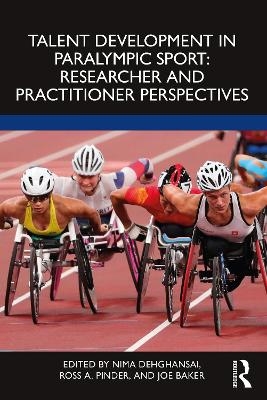
Talent Development in Paralympic Sport
Routledge (Verlag)
978-1-032-02646-6 (ISBN)
Identifying and developing talented athletes to their fullest potential is a central concern of sports scientists, sports coaches, and sports policymakers. However, there is very little practical and theoretical knowledge for those working in Paralympic sport. The book collates the state of the science of current knowledge and practice in talent identification and development in this context by capturing international perspectives of current systems and processes.
Written by a team of leading international experts, Talent Development in Paralympic Sport: Researcher and Practitioner Perspectives explores key factors and issues in contemporary sport, including:
• current state of pathways in Paralympic sports across the globe
• designing optimal developmental environments
• long-term modeling of Paralympic athlete development
• understanding the complexity of talent selection in Paralympic sport
With an emphasis on practical implications for all those working in sport, the book offers an authoritative evaluation of the strengths and weaknesses of contemporary systems for identifying and developing talent in Paralympic sport. This is important reading for any student, researcher, practitioner, or coach with an interest in skill acquisition, youth Para sport, elite Paralympic sport, Paralympic sports coaching, Paralympic sports development, sport psychology, skill development, or sports engineering. In addition, there has been interest from universities to offer courses/modules specific to Paralympic sports.
Nima Dehghansai, Ph.D. is an athlete development specialist with Paralympics Australia. His research focuses on identifying factors that can influence the health of the pathway including athlete attraction, recruitment, development, and expertise. He is currently working alongside key Australian stakeholders on various strategies to optimize environments to maximize athlete development for sustained podium success. Ross A. Pinder, Ph.D. is an experienced skill acquisition specialist with Paralympics Australia, where he leads a team of sports scientists and applied researchers aiming to develop world-leading learning environments. Ross has supported elite coaches and athletes to achieve success at major international events, including the Rio 2016 and Tokyo 2020 Paralympic Games, notably in Para Archery, Para Athletics, Para Cycling, Para Table Tennis, Wheelchair Tennis, and Wheelchair Rugby. He currently supervises several higher degree research students through national and international collaborations. Joe Baker, Ph.D. is a Professor and Head of the Lifespan Performance Laboratory in the School of Kinesiology and Health Science, at York University, Canada. His research focuses on talent identification, skill acquisition, and athlete development. He also works with elite teams and organizations around the world to optimize athlete performance and development.
1. Talent Development Opportunities and Challenges in Paralympic Sport: An Introduction
2. Paralympic Pathways
Practitioner Commentary: Gail Hamomoto
3. Top-down Systemic Challenges to Current Paralympic Pathways
Practitioner Commentary: Andy Van Neutegem
4. Athlete Recruitment: Promoting Initial and Sustained Engagement in Para Sport
Practitioner Commentary: Michael Frogley
5. Understanding the Complexity of Athlete Selection in Paralympic Sport
Practitioner Commentary: Chris Wagg
6. The Role of Classification in Talent Identification and Development in Para Sports
Practitioner Commentary: Michael Woods
7. Striking a Balance: Promoting Quantity and Quality of Participation in Para Sport
Practitioner Commentary: Jenny Davey
8. The Role of Skill Acquisition in Coach and Athlete Development in Paralympic Sport
Practitioner Commentary: Raôul Oudejans
9. Talent Transfer in Paralympic Sport
Practitioner Commentary: Melissa Wilson
10. Coaching, Talent Identification and Talent Development in Para Sport: Developing the Field
Practitioner Commentary: Graeme Maw
11. Role of Technology in Athlete Assessment
Practitioner Commentary: David Haydon
12. Physiological Considerations for Para Athletes
Practitioner Commentary: Gary Brickley
13. The Psychology of Talent Development in Paralympic Sport: The Role of Personality
Practitioner Commentary: Hannah MacDougall
14. The Overemphasis on ‘Talent’ in Parasport Development
Practitioner Commentary: Raphael Moreira
| Erscheinungsdatum | 11.07.2022 |
|---|---|
| Zusatzinfo | 2 Tables, black and white; 17 Line drawings, black and white; 5 Halftones, black and white; 22 Illustrations, black and white |
| Verlagsort | London |
| Sprache | englisch |
| Maße | 152 x 229 mm |
| Gewicht | 322 g |
| Themenwelt | Sachbuch/Ratgeber ► Sport |
| Medizin / Pharmazie ► Allgemeines / Lexika | |
| Medizinische Fachgebiete ► Chirurgie ► Unfallchirurgie / Orthopädie | |
| Medizin / Pharmazie ► Medizinische Fachgebiete ► Sportmedizin | |
| Studium ► 1. Studienabschnitt (Vorklinik) ► Physiologie | |
| ISBN-10 | 1-032-02646-4 / 1032026464 |
| ISBN-13 | 978-1-032-02646-6 / 9781032026466 |
| Zustand | Neuware |
| Haben Sie eine Frage zum Produkt? |
aus dem Bereich


